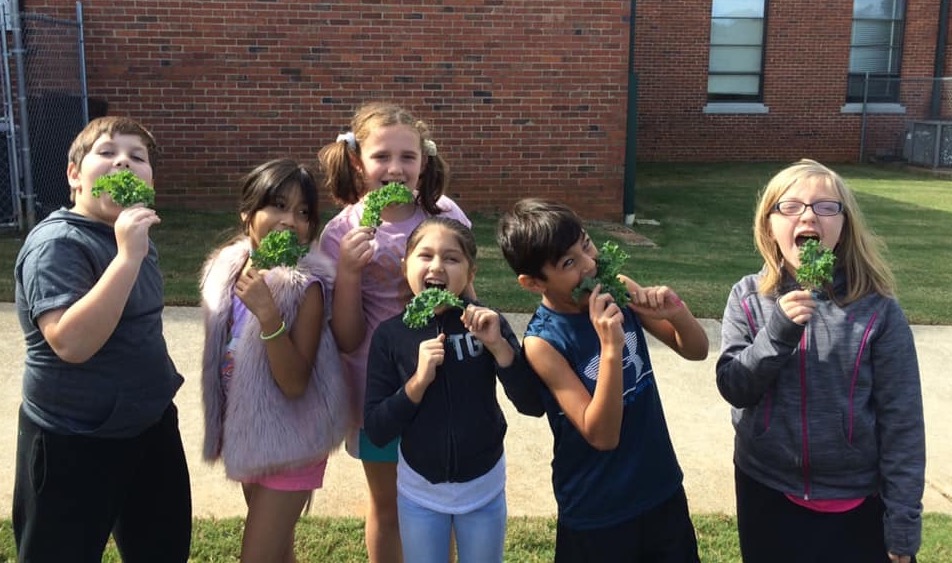test-blog
Ag in the Cafeteria: Teaching students how farmers grow their food
Posted on February 23, 2020 7:00 PM
By Jennifer Whittaker, Georgia Farm Bureau
County Farm Bureaus have been working with teachers to introduce students to agriculture through Ag in the Classroom (AITC) since the 1980s. Now, many counties are expanding their AITC efforts to work with school nutrition staff.
Most counties working with nutrition staff can trace their efforts back to 2011 when the Georgia Departments of Agriculture and Education began the Feed My School for a Week Program. This program aims to get locally grown food into school cafeterias and make kids excited to eat healthy.
Another program that’s given county Farm Bureaus a chance to work with school nutrition staff is the Golden Radish Award. This award is presented to school systems each fall by the Georgia Departments of Agriculture, Education, Early Care & Learning and Public Health, UGA Cooperative Extension and Georgia Organics.

Barrow County students are learning to eat their veggies.
(Photo courtesy of Barrow Co. School System)
School systems can earn platinum, gold, silver, bronze or honorary recognition for meeting criteria that include: serving locally grown items in the cafeteria; students taste testing fresh, locally grown food; farmers visiting the school or students visiting a farm; students doing cooking/food activities; teachers integrating farm to school lessons into their curriculum; growing edible gardens; engaging parents or community members in the farm to school program; and school staff taking farm to school professional training.
Barrow County
For several years Barrow County Farm Bureau (BCFB) has provided seeds for all the school gardens in Barrow County to grow vegetables like kale, lettuce and radishes, BCFB Office Manager Staci Waters said. The vegetables are served in the school cafeterias or used for classroom taste tests.
BCFB member Missy Crane, who grows vegetables on her farm, often visits the schools to help teachers plant and harvest their crops.
Waters represents BCFB in the Barrow County Farm to School Booster Club working closely with the school district nutritionist and other ag organizations. Each year the club holds a dinner to raise funds for school gardens and ag education projects. Last year the dinner raised over $6,000.
“I go into the classrooms and start talking about different aspects of agriculture, and the kids just love it,” Waters said.
Treutlen County
The Treutlen County Schools (TCS) nutrition program has been implementing farm to school concepts in its cafeterias for 8 years, said TCS Food Services Director Alecia “Red” Barrett, who learned of the concept at a conference.
“When I took this concept back to the kids, I saw how much it excited them. It made learning fun, and they needed to know where their food comes from,” Barrett said.
Barrett reached out to the Treutlen County Farm Bureau in 2014 seeking help to install school gardens. Since then, TCFB has helped install numerous garden beds at the county’s K-12 grade school, secured a USDA grant to fund a greenhouse for the high school students and gave fruit trees for the school’s campus.
In the fall, students plant carrots, collards, mustard greens, kale, brussels sprouts and radishes used in school meals. In the spring they plant tomatoes, cucumbers and peppers that are used in the school’s summer lunch program.
Barrett introduced TCFB to teachers willing to let the county visit their classes to do AITC lessons.
“Red has been our liaison to the teachers,” TCFB President Kim Thompson said.
Last summer, Thompson and TCFB Office Manager Doris Warnock used a $1,000 grant from the Georgia Foundation for Agriculture to provide five weekly ag programs for the county summer lunch program. Each week TCFB presented programs on various vegetables, peanuts and planting seeds.
“We took fresh corn for the students to shuck, peas for them to shell, peanut plants so they could see how peanuts grow underground and let them plant their own tomato seeds,” Thompson said. “I know it’s hard to believe because we’re a rural county, but their idea of corn is what they get out of a can, and we had kids who thought peanuts grow on trees.
Cherokee County
Cherokee County Farm Bureau partnered with Georgia Organics in 2011 to start the county’s Farm to School program, CCFB Office Manager Shirley Pahl said. Today the program committee includes teachers and nutrition directors, Extension staff, farmers and master gardeners.
“Our main focus is ag education. We wanted to be able to go to more schools to teach the children where their food comes from and the farm to school program was a good way to do it,” Pahl said.
Over the past nine years, Pahl says CCFB has given materials for school garden beds or helped build garden beds at the county’s 11 elementary schools.
CCFB also annually hosts summer workshops for teachers and nutrition staff that take school staff to farms to let them see how farmers are growing crops and livestock. The workshops include chefs demonstrating recipes teachers can make in their classes.
Habersham County
Last August, Habersham County Farm Bureau hosted a workshop for 78 nutrition managers who work in the county’s 13 schools ranging from elementary to high school. Habersham County staff and volunteers taught the school nutrition employees how to hold taste tests for different food items with their students as a way to get them to try new food.
“Holding this workshop introduced the nutrition managers to the Ag in the Classroom resources Farm Bureau can offer,” HCFB Office Manager Justine Palmer said. “Now one school is cultivating a school garden. I can’t stress enough the importance of making a connection with your school nutrition director. It’s another way to get into schools if you don’t have an in with a teacher or a principal.”
HCFB is making plans to host another workshop for school nutrition staff. This time the focus will be on introducing staff to Georgia Farm Bureau Certified Farm Markets that can supply the schools with locally grown food.